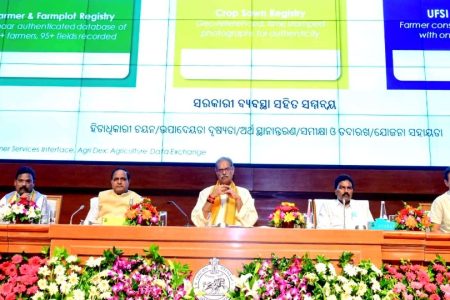Bhubaneswar: Deputy Chief Minister Kanak Vardhan Singh Deo has called for major reforms in Odisha’s paddy procurement system, aiming to make the process more efficient and transparent. Speaking at the District Collectors’ conference at Lok Seva Bhavan on Friday, Singh Deo outlined a series of initiatives to ease the burden on farmers and ensure fair practices during the upcoming procurement season.
One of the key measures introduced was allowing farmers to sell their paddy in mandis (markets) located in neighboring districts if procurement in their own district faces delays or challenges. “This will provide flexibility and ensure farmers can sell their produce without unnecessary hurdles,” said Singh Deo. He also emphasized that all paddy registrations should be conducted online, with GPS tracking implemented to monitor vehicles transporting the crop, thereby ensuring transparency and preventing any tampering during transit.
Additionally, Singh Deo clarified that millers will be responsible for providing essential materials like gunny bags and jute twine to farmers. To further support agricultural activities, he announced plans to establish 58 new cold storage facilities across the state to preserve crops and reduce wastage.
Highlighting the need for agricultural diversification, the Deputy CM urged farmers to adopt organic multi-crop farming instead of relying solely on paddy cultivation. “Diversifying crops will not only improve soil health but also provide farmers with better financial security,” he said.
The conference also saw the introduction of the AGRI STACK App, developed by the Agriculture Department, which will integrate data on registered farmers and their agricultural lands. This app will be linked to the government’s digital crop survey and will enable better management of farmer registration data, ensuring smoother procurement processes.
Rajesh Prabhakar Patil, Commissioner-cum-Secretary of the Cooperative Department, outlined additional measures to support farmers during procurement. These include the deployment of Nodal Officers and Supervisors to oversee the operations of each mandi and ensure a fair and efficient process.
Cooperation Minister Pradeep Bal Samanta urged District Collectors to take strict action against millers and middlemen who exploit farmers by offering prices lower than the government-set rate of ₹3,100 per quintal. Samanta also highlighted the need to prepare additional warehouses for grain storage, as 4,006 mandis will be involved in the procurement during the kharif season.
Food Supply and Consumer Welfare Minister Krushna Chandra Patra announced that paddy procurement would begin within the next two months, assuring that strict measures would be taken against any deductions by middlemen. Patra praised the government’s efforts to safeguard farmers’ interests, stressing the importance of fair trade practices in the procurement process.
Principal Secretary of Cooperation, Vir Vikram Yadav, revealed that the state has set an ambitious target to collect one crore metric tonnes of paddy across both the kharif and rabi seasons this year, a 25% increase from previous years. He urged District Collectors to complete the verification of farmers’ accounts well in advance of procurement to prevent errors in payments.
Yadav also emphasized the need to raise awareness among farmers about bringing high-quality paddy to the market, ensuring that they receive the best possible returns for their hard work.

